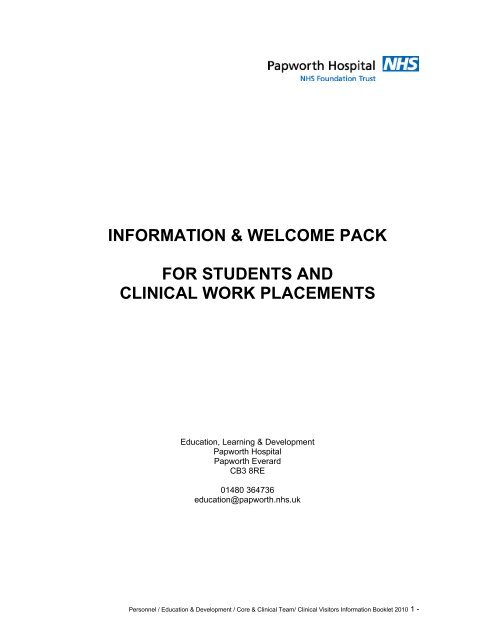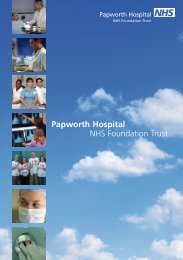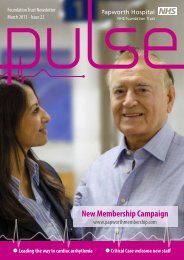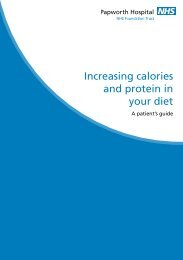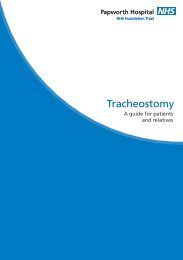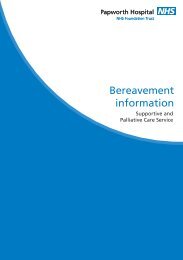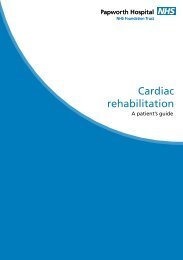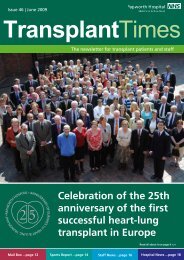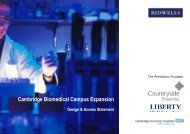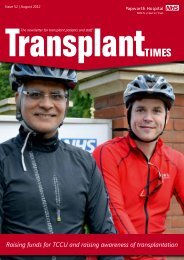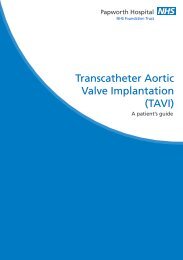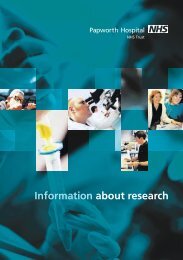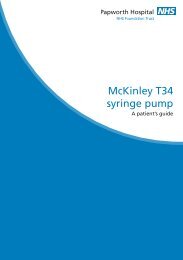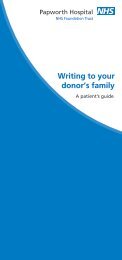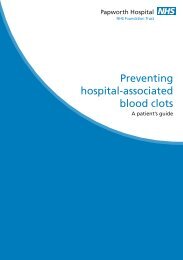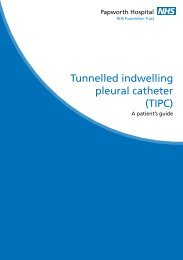information & welcome pack for students and clinical work placements
information & welcome pack for students and clinical work placements
information & welcome pack for students and clinical work placements
You also want an ePaper? Increase the reach of your titles
YUMPU automatically turns print PDFs into web optimized ePapers that Google loves.
INFORMATION & WELCOME PACK<br />
FOR STUDENTS AND<br />
CLINICAL WORK PLACEMENTS<br />
Education, Learning & Development<br />
Papworth Hospital<br />
Papworth Everard<br />
CB3 8RE<br />
01480 364736<br />
education@papworth.nhs.uk<br />
Personnel / Education & Development / Core & Clinical Team/ Clinical Visitors In<strong>for</strong>mation Booklet 2010 1 -
CONTENTS<br />
1. Welcome<br />
2. What you can expect from us<br />
3. What we expect from you<br />
4. In<strong>for</strong>mation about Papworth Hospital<br />
5. Learning Opportunities<br />
6. Learning Resources<br />
7. Local Induction Checklist<br />
8. Evaluation of Placement<br />
Personnel / Education & Development / Core & Clinical Team/ Clinical Visitors In<strong>for</strong>mation Booklet 2010 2 -<br />
3<br />
3<br />
3<br />
5<br />
6<br />
14<br />
15<br />
17
1. WELCOME<br />
Welcome to your placement at Papworth Hospital. This <strong>pack</strong> has been put together to<br />
provide you with <strong>in<strong>for</strong>mation</strong> <strong>for</strong> your placement with us.<br />
The following <strong>in<strong>for</strong>mation</strong> will be provided to you on your first day with us.<br />
Mentor Name: __________________________________<br />
Supervisor: __________________________________<br />
Link Tutor: __________________________________<br />
Placement Co-ordinator: __________________________________<br />
2. WHAT YOU CAN EXPECT FROM US<br />
� You will receive an induction into your <strong>work</strong> area to ensure you are familiar with the<br />
environment <strong>and</strong> are able to practice safely<br />
� You will discuss your learning needs <strong>and</strong> outcomes at the beginning of the placement<br />
� We will provide an environment conducive to meeting identified an individual student<br />
learning need which is also safe <strong>and</strong> healthy.<br />
� During your placement you will be allocated a mentor to <strong>work</strong> alongside. The mentor will<br />
be a qualified practitioner who will assist <strong>and</strong> support you during your <strong>clinical</strong> <strong>work</strong>.<br />
� Your mentor will assess your per<strong>for</strong>mance against your course learning outcomes, <strong>and</strong><br />
provide feedback to help you develop your skills.<br />
� You will receive supervision during your <strong>clinical</strong> practice.<br />
� You will be a valued member of the multidisciplinary team during your placement, <strong>and</strong><br />
can expect support from all your colleagues<br />
� We will listen to your feedback about your placement <strong>and</strong> will respond to any issues<br />
raised sensitively<br />
3. WHAT WE EXPECT FROM YOU<br />
� We expect you to arrive on time <strong>for</strong> planned shifts <strong>and</strong> any other activity identified by the<br />
Mentor or delegated supervisor<br />
� We expect you to ensure your Mentor is aware of your learning outcomes <strong>for</strong> the<br />
placement <strong>and</strong> specific learning needs<br />
� We expect you to act in a professional manner.<br />
� We expect you to dress in accordance with your College / University uni<strong>for</strong>m policy, <strong>and</strong><br />
also in accordance with the Papworth uni<strong>for</strong>m policy.<br />
Personnel / Education & Development / Core & Clinical Team/ Clinical Visitors In<strong>for</strong>mation Booklet 2010 3 -
� You should in<strong>for</strong>m your mentor or delegated person if you are unwell <strong>and</strong> not able to<br />
attend your placement. The process <strong>for</strong> how to do this will be covered on your local<br />
induction to Papworth.<br />
� We expect you to maintain <strong>and</strong> respect confidentiality at all times. This applies to clients,<br />
their records <strong>and</strong> discussions between the student <strong>and</strong> the Mentor.<br />
� We would like you to raise any issues regarding your placement with your mentor. If this<br />
is not possible you should contact your link tutor / placement co-ordinator<br />
Personnel / Education & Development / Core & Clinical Team/ Clinical Visitors In<strong>for</strong>mation Booklet 2010 4 -
4. INFORMATION ABOUT PAPWORTH HOSPITAL<br />
Papworth Hospital is a specialist cardiothoracic hospital located 12 miles from Cambridge, in<br />
the village of Papworth Everard. For a map of how to find us please see www.papworthhospital.org.uk<br />
The hospital first opened in 1917 as a tuberculosis hospital <strong>and</strong> when Mr Pendrill Varrier-<br />
Jones conceived the idea, he wanted to create not just a hospital, but also a community.<br />
This sense of community remains, but our <strong>work</strong> has grown over the years.<br />
During the 1950s, Papworth became one of the region’s main hospitals, developing first<br />
thoracic surgery, then cardiac surgery <strong>and</strong> cardiology. Today, we are a Foundation Trust <strong>and</strong><br />
are the country’s main heart <strong>and</strong> lung transplant centre. We provide a full range of adult<br />
services in cardiology, cardiac surgery, thoracic surgery <strong>and</strong> respiratory medicine. We also<br />
offer deliver a number of highly specialised services in respiratory medicine <strong>and</strong> thoracic<br />
surgery to the national population.<br />
We treat over 22,000 in-patients <strong>and</strong> day cases <strong>and</strong> 48,000 outpatients each year; have<br />
1,500 staff, 270 beds <strong>and</strong> an annual budget of over £120 million. We provide a full range of<br />
adult services in cardiology, cardiac surgery, thoracic surgery <strong>and</strong> respiratory medicine, <strong>and</strong><br />
are the country’s main heart <strong>and</strong> lung transplantation centre. We also deliver a number of<br />
highly specialised services in respiratory medicine <strong>and</strong> thoracic surgery to the national<br />
population. We are the only centre in the UK to per<strong>for</strong>m pulmonary thromboendarterectomy<br />
surgery, <strong>and</strong> only one of three centres in the UK trialling ventricular-assist device therapy.<br />
Our facilities include the following beds (as at 2010)<br />
� 32 Critical Care<br />
� 22 Higginson Ward<br />
� 40 Mallard Ward<br />
� 20 Varrier Jones<br />
� 27 Hugh Fleming<br />
� 15 Heming<strong>for</strong>d Ward<br />
� 4 High Dependency Beds<br />
� 36 Respiratory Support <strong>and</strong> Sleep Centre<br />
� 16 Princess Ward<br />
� 12 Duchess Ward<br />
� 9 Baron Ward<br />
� 8 Cystic Fibrosis Unit<br />
� 19 Cardiac Day Ward<br />
� 14 Thoracic Day Ward<br />
� 5 Hostel Beds<br />
Of these, 237 are inpatient beds <strong>and</strong> 33 are day case beds. We also have:<br />
� 5 Operating Theatres,<br />
� 5 Angiographic Suites,<br />
� 2 CT Scanner,<br />
� 1 Permanent MRI Scanner.<br />
Personnel / Education & Development / Core & Clinical Team/ Clinical Visitors In<strong>for</strong>mation Booklet 2010 5 -
5. LEARNING OPPORTUNITIES<br />
About our services<br />
CARDIAC SERVICES<br />
Mallard Ward is a 40 bedded surgical ward seeing patients undergoing cardiac surgery <strong>and</strong><br />
transplantation. Patients with Ventricular Assist Devices (VADs) are also cared <strong>for</strong> on this<br />
ward.<br />
Varrier Jones Ward is a 20 bedded ward caring <strong>for</strong> both private patients <strong>and</strong> NHS patients<br />
undergoing cardiology <strong>and</strong> cardiothoracic procedures, including lung <strong>and</strong> oesophageal<br />
surgery, <strong>and</strong> those requiring medical management.<br />
Hugh Fleming has 27 beds providing care <strong>for</strong> patients undergoing cardiology procedures /<br />
cardiac surgery <strong>and</strong> provides support <strong>for</strong> those patients with heart failure <strong>and</strong> those awaiting<br />
cardiac transplant.<br />
Cardiac Day Ward has 19 beds providing a nurse led service, operating from 8am to 8pm 5<br />
days per week. It delivers care to patients undergoing day-case angiography, Percutaneous<br />
Coronary Intervention (PCI), electrophysiology studies / ablation <strong>and</strong> surgery. The team here<br />
also runs a wound review service.<br />
Higginson Ward has 22 beds <strong>and</strong> provides care <strong>for</strong> patients primarily undergoing a wide<br />
range of thoracic surgical procedures, including oesophagectomy <strong>and</strong> pneumonectomy. The<br />
team provides a pre admission service <strong>for</strong> patients with cancer who are to be admitted <strong>for</strong><br />
surgery.<br />
Hemming<strong>for</strong>d Ward currently has 15 beds <strong>and</strong> 4 High Dependency beds. Patients nursed<br />
here are those undergoing cardiology procedures <strong>and</strong> cardiac surgery.<br />
Radiology Department sees a specialist team assisting in diagnostic <strong>and</strong> interventional<br />
cardiology, pacemaker insertions <strong>and</strong> electrophysiology studies.<br />
Cardiac Technicians provide a service in 4 main areas – Cardiac Catheter laboratory,<br />
electrophysiology / pacemaker / internal defibrillator, non-invasive investigations <strong>and</strong><br />
echocardiography.<br />
Cardiac Support Nurse Team provide a pre-admission service <strong>for</strong> patients prior to surgery<br />
giving explanations about their treatment <strong>and</strong> recovery. The team see the patients following<br />
their operations <strong>and</strong> provide a link line once the patient has been discharged. A pre-hab<br />
service is also provided supporting patients between diagnosis of coronary heart disease<br />
<strong>and</strong> surgery.<br />
Electrophysiology Nurse Specialist <strong>work</strong>s alongside the Cardiac Electrophysiology Unit to<br />
provide support <strong>and</strong> education to patients with Cardiac Arrhythmias who require<br />
Electrophysiological Studies (EPS) <strong>and</strong>/or Radio-Frequency Ablation (RFA) <strong>and</strong> in particular<br />
to those awaiting or with an Implantable Cardioverter Defibrillator (ICD). Patients awaiting<br />
these procedures require extensive psychological preparation particularly those requiring an<br />
ICD as many may have already experienced a serious ventricular arrhythmia requiring<br />
resuscitation <strong>and</strong> hospitalisation alongside drug therapy. This role is also highly committed<br />
to ensuring that nurses within the Cardiac Directorate have the knowledge <strong>and</strong> skills to<br />
support <strong>and</strong> care <strong>for</strong> this group of patients.<br />
Personnel / Education & Development / Core & Clinical Team/ Clinical Visitors In<strong>for</strong>mation Booklet 2010 6 -
Tissue Viability Nurse Specialist provides a Trust wide service <strong>for</strong> the effective<br />
management of surgical wounds, pressure <strong>and</strong> leg ulcers. The post holder is responsible <strong>for</strong><br />
ensuring that staff are knowledgeable <strong>and</strong> competent in the art of wound management,<br />
through the development of assessment skills <strong>and</strong> the introduction of new techniques,<br />
dressings <strong>and</strong> management strategies.<br />
What you can expect from a placement within the Cardiac Services Directorate<br />
You can expect to be <strong>welcome</strong>d to a team who hold a very good level of experience <strong>and</strong><br />
knowledge in delivering care to the wide range of cardiology <strong>and</strong> cardiothoracic surgical<br />
patients that we cater <strong>for</strong>. In addition to this you will have access to a wide range of other<br />
experienced personnel, i.e. Tissue Visibility Nurse Specialist, Cardiac Specialist nurse<br />
Team, Electrophysiology Nurse Specialist, physiotherapists <strong>and</strong> many more, helping you to<br />
address the holistic needs of the patient. You can expect to be able to visit other areas<br />
pertinent to the care/treatment of your patient i.e. theatres, catheter laboratory, critical care<br />
<strong>and</strong> pre-admission clinic.<br />
Staff within the directorate will support your learning in a proactive manner engaging you in<br />
making choices regarding your individual needs.<br />
Personnel / Education & Development / Core & Clinical Team/ Clinical Visitors In<strong>for</strong>mation Booklet 2010 7 -
About our services<br />
About the unit <strong>and</strong> the patients we care <strong>for</strong><br />
CRITICAL CARE<br />
Critical Care (CCA) at Papworth believes in putting patients at the centre of Critical Care<br />
Services. We place high value on evidence based nursing care, good communication, a<br />
supportive professional atmosphere, <strong>and</strong> believe these underpin the delivery of high quality<br />
care in an advanced technological environment. Attention to detail <strong>and</strong> pride in the unit by<br />
all staff is essential to ensure an exemplary st<strong>and</strong>ard is maintained.<br />
The unit comprises 5 bays (bay A, B, C, D <strong>and</strong> E) <strong>and</strong> includes 6 single rooms, giving a total<br />
of 32 beds. We take patients who require high dependency or intensive care <strong>and</strong> staff the<br />
beds accordingly. Intensive care patients are nursed 1:1, <strong>and</strong> the nursing ratio <strong>for</strong> high<br />
dependency patients varies between 1:2 or 1:3 depending on the condition of patients. Most<br />
of the patients who come to Critical Care have had planned major heart surgery. The most<br />
common operations per<strong>for</strong>med are coronary artery bypass surgery (CABG) <strong>and</strong> valve<br />
re<strong>placements</strong>. The majority of these patients are cared <strong>for</strong> within the Cardiac Recovery Unit<br />
(which is within one of the bays on Critical Care). This is a specially designated area <strong>for</strong><br />
overnight care of patients following surgery. The aim is that they are transferred back to the<br />
ward the following day or, if requiring further intervention, are transferred to the Critical Care<br />
Area. In addition to this routine <strong>work</strong>, the unit also admits patients following other major<br />
surgery including heart or lung transplants, thoracic aortic aneurysm repair, patients<br />
requiring cardiac assist devices (VADs) <strong>and</strong> following pulmonary endarterectomy surgery<br />
(PEA). The unit will also take any patient from within the hospital with organ failure.<br />
The Team<br />
All staff <strong>work</strong>ing within Critical Care undergo a comprehensive training programme to help<br />
equip them <strong>for</strong> nursing in this specialised field. Clinical <strong>and</strong> managerial practice is guided by<br />
procedures <strong>and</strong> guidelines to help ensure that a common good st<strong>and</strong>ard of practice is<br />
maintained throughout the unit. CCA has an establishment of approximately 200 nursing<br />
staff, both full <strong>and</strong> part time.<br />
Learning opportunities<br />
Learning opportunities in CCA will include caring <strong>for</strong> patients following major heart <strong>and</strong> lung<br />
surgery including heart/lung transplantation. Experience can be gained caring <strong>for</strong> patients<br />
needing advanced monitoring, organ support (including ventilation, renal support <strong>and</strong> cardiac<br />
assist devices), <strong>and</strong> following the progress of individual patients as they recover <strong>and</strong> return<br />
to the ward. Students are encouraged to spend time with the critical care outreach team <strong>and</strong><br />
other specialist nurses <strong>and</strong> to take full advantage of any other opportunities that arise.<br />
Personnel / Education & Development / Core & Clinical Team/ Clinical Visitors In<strong>for</strong>mation Booklet 2010 8 -
About our services<br />
RESPIRATORY SUPPORT AND SLEEP CENTRE (RSSC)<br />
The RSSC is a 36 bedded progressive care unit specialising in the treatment of patients with<br />
respiratory <strong>and</strong> sleep disorders. It is a national centre accepting referrals from the whole of<br />
the UK.<br />
The unit offers various treatments to a wide range of patients, which include:<br />
� A weaning programme <strong>for</strong> patients with prolonged weaning problems;<br />
� Initiation of domiciliary non-invasive ventilation <strong>and</strong> Continuous Positive Airway<br />
Pressure (CPAP) <strong>and</strong> the subsequent care <strong>and</strong> support;<br />
� long term oxygen therapy;<br />
� Investigations of numerous sleep disorders – the majority of which are carried out in<br />
the sleep laboratory with treatments being undertaken on the ward.<br />
� Day case clinics <strong>for</strong> patients with motor neurone disease.<br />
� Nurse led CPAP clinics.<br />
A multidisciplinary team approach results in the patients receiving individualised care.<br />
Education <strong>and</strong> <strong>in<strong>for</strong>mation</strong> giving is vital to ensure compliance with the use of non-invasive<br />
ventilation in the home.<br />
Nurse Education/Development<br />
Nurses on the RSSC are given two mentors to <strong>work</strong> alongside <strong>for</strong> the first month of<br />
employment as well as the support from the Education sister in order to <strong>work</strong> towards<br />
competencies specific to the RSSC.<br />
These include: -<br />
� commencing a patient on non-invasive ventilation;<br />
� commencing a patient on Continuous Positive Airway Pressure (CPAP) therapy;<br />
� per<strong>for</strong>ming a sleep study;<br />
� care of the patient with a tracheostomy.<br />
� Care of an invasively ventilated patient.<br />
� Care of Nasogastric <strong>and</strong> PRG tubes.<br />
Training needs are identified as part of a Personal Development Plan <strong>and</strong> nurses are<br />
encouraged to undertake further education <strong>and</strong> develop themselves through a variety of<br />
learning opportunities.<br />
These include:<br />
� observing on the ward rounds;<br />
� participating <strong>and</strong> attending teaching sessions within the directorate;<br />
� visiting different departments within the directorate to gain an insight into the patient<br />
journey;<br />
� undertaking courses run by Anglia Ruskin University, Cambridge;<br />
� Attending in-house study days.<br />
The RSSC <strong>welcome</strong>s visitors from all disciplines <strong>and</strong> regularly has student’s pre registration<br />
<strong>and</strong> post registration on <strong>placements</strong>.<br />
Personnel / Education & Development / Core & Clinical Team/ Clinical Visitors In<strong>for</strong>mation Booklet 2010 9 -
About our services<br />
CHEST MEDICAL UNIT<br />
The Chest Medical Unit is 37 bedded ward, which is divided into three main areas: Princess,<br />
which has 16 beds, Baron, which has 9 beds <strong>and</strong> Duchess, which has 12 beds.<br />
The ward specialises in the care of patients with chronic <strong>and</strong> acute respiratory diseases.<br />
This includes patients with:<br />
� Pulmonary hypertension;<br />
� Lung cancer;<br />
� Lung defence patients;<br />
� Cystic fibrosis;<br />
� Patients within the transplantation programme.<br />
The multidisciplinary team provides a collaborative approach, which aims to promote a <strong>for</strong>um<br />
designed to establish links between clinics, ward <strong>and</strong> community within which the ongoing<br />
needs of patients are met.<br />
Patients are encouraged to participate in planning their own care, including selfadministration<br />
of oral <strong>and</strong> intravenous medications <strong>and</strong> support in this is provided by highly<br />
skilled nurses.<br />
Nurses Education/Development<br />
Nurses, both trained <strong>and</strong> untrained, are encouraged to undertake further education to help<br />
with their professional development, which includes:<br />
� Participating in teaching sessions within the ward area;<br />
� Attending study days;<br />
� Undertaking courses e.g. mentorship, respiratory <strong>and</strong> thoracic module, etc;<br />
� Undertaking a national vocational qualification.<br />
Nurses are also encouraged to extend their roles <strong>and</strong> support is provided <strong>for</strong> this. Extended<br />
roles include:<br />
� Venepuncture <strong>and</strong> cannulation;<br />
� Insertion of midlines;<br />
� INR check;<br />
� Taking CABG’s.-capillary arterial blood gases<br />
� Prostanoid therapy<br />
Summary of learning opportunities<br />
To gain insight into the management <strong>and</strong> support facilities <strong>for</strong> patients with respiratory<br />
diseases by:<br />
� Observing procedures <strong>and</strong> investigations e.g. FOB, RHC, Echo etc;<br />
� Attending multidisciplinary meetings;<br />
� Participating in ward rounds;<br />
� Spending time with other disciplines e.g. Dietician, Physiotherapist, etc.<br />
In addition to this, the team undertakes research projects, the findings of which are<br />
presented at both national <strong>and</strong> international conferences.<br />
Personnel / Education & Development / Core & Clinical Team/ Clinical Visitors In<strong>for</strong>mation Booklet 2010 10 -
About our services<br />
CYSTIC FIBROSIS (CF) UNIT<br />
The Cystic Fibrosis (CF) Unit is an 8 bedded specialised regional unit bridging the care<br />
needed between paediatric <strong>and</strong> adult patients with Cystic Fibrosis. The majority of patients<br />
are adolescents – some of whom are assessed <strong>for</strong> suitability <strong>for</strong> transplantation.<br />
CF is a genetically inherited disorder affecting many systems including respiratory, digestive,<br />
reproductive, liver <strong>and</strong> pancreas. The most common complaint patients present with are<br />
repeated chest infections, which can result in loss of lung function <strong>and</strong> eventually respiratory<br />
failure. Our main aim in caring <strong>for</strong> this patient group is to maximize <strong>and</strong> maintain lung<br />
function whilst creating a relatively normal environment which allows patients to continue<br />
their everyday activities. This is often achieved by teaching patients to administer their own<br />
intravenous antibiotics at home <strong>and</strong> this is supported by good patient education <strong>and</strong><br />
community back-up by our nursing staff. This encourages many patients to continue with<br />
school or college <strong>and</strong> to return to <strong>work</strong>. For those patients who have to be admitted into the<br />
Unit we have created a home from home environment with individual rooms that have been<br />
equipped with items that can be found in most adolescent/young adult bedrooms i.e.<br />
TV/Video, CD player, etc.<br />
The multidisciplinary team provides a collaborative approach to care, providing a link<br />
between hospital <strong>and</strong> home, <strong>and</strong> is progressive in encouraging nursing staff to extend their<br />
roles enabling the provision of highly individualised patient care. This includes:<br />
� care <strong>and</strong> access of Totally Implanted Venous Access Devices (TIVAD);<br />
� venepuncture <strong>and</strong> cannulation;<br />
� insertion of midlines;<br />
� care of gastrostromy feeding tubes (PEG’s <strong>and</strong> Mic-Key);<br />
� Taking CABG’s – capillary arterial blood gases.<br />
� Use of different home care delivery systems <strong>for</strong> IV administration.<br />
There is a ward-based outpatient clinic that caters <strong>for</strong> new referrals <strong>and</strong> annual reviews.<br />
Summary of learning opportunities<br />
To gain insight into the management <strong>and</strong> support facilities <strong>for</strong> patients with CF by:<br />
� Attending CF clinics;<br />
� Attending weekly multidisciplinary meetings;<br />
� Visiting other departments with the patients <strong>for</strong> procedures i.e. insertion of TIVADs;<br />
� Community visits.<br />
To gain an underst<strong>and</strong>ing of the treatment <strong>and</strong> holistic approach to caring <strong>for</strong> patients with<br />
CF by:<br />
� Teaching sessions with members of the CF team;<br />
� Participating in research/development projects, the findings of which are often<br />
presented at both national <strong>and</strong> international conferences.<br />
Personnel / Education & Development / Core & Clinical Team/ Clinical Visitors In<strong>for</strong>mation Booklet 2010 11 -
About our services<br />
THORACIC DAY WARD<br />
AND OUTPATIENTS<br />
The Thoracic Day Ward is situation near main reception at the front of the hospital. It<br />
consists of 14 beds <strong>and</strong> provides an environment <strong>for</strong> patients to be managed through<br />
various invasive <strong>and</strong> non-invasive investigations <strong>and</strong> procedures.<br />
A b<strong>and</strong> 7 sister <strong>and</strong> a team of experienced nurses, who come from a variety of <strong>clinical</strong><br />
backgrounds, lead the ward.<br />
Beds are allocated to specialist services including:<br />
� Thoracic oncology (Pathos lung cancer <strong>and</strong> mesothelioma service);<br />
� Pulmonary vascular diseases;<br />
� Immunology patients;<br />
� General respiratory medicine;<br />
� Cystic fibrosis;<br />
� Bronchiectasis;<br />
� Interstitial lung disease.<br />
Summary of learning opportunities<br />
� Insight into the holistic management of day case patients from admission to<br />
discharge;<br />
� Pre <strong>and</strong> post care of patients undergoing diagnostic procedures i.e. fibre optic<br />
bronchoscopy, needle <strong>and</strong> pleural biopsy;<br />
� Psychological care of patients with uncertain diagnosis;<br />
� Insight into the care <strong>and</strong> management of patients with immunodeficiency undergoing<br />
replacement therapy;<br />
� Insight into different types of venous access e.g. mid lines <strong>and</strong> passports.<br />
� Participate in patient health education <strong>and</strong> promotion;<br />
� Observe the teaching of safe practice in the administration of home IV therapy;<br />
� Insight into nurse led admission <strong>and</strong> discharge of some specific patient groups;<br />
� Opportunity to escort patients <strong>and</strong> observe procedures or investigations within other<br />
departments;<br />
� Attend multidisciplinary meetings.<br />
The Thoracic Outpatient Department is situated at the front of the hospital beneath the Chest<br />
Medical Unit <strong>and</strong> is next to the Diagnostic Imaging Suite (CT Scan). The department <strong>work</strong>s<br />
closely with the Respiratory Physiology Laboratory Technicians who see many of the<br />
patients <strong>for</strong> lung function testing prior to consultation.<br />
The Department consists of ten consulting rooms adjacent to a central waiting are. Rooms<br />
are used by the various members of the multidisciplinary team: physiotherapists, dieticians,<br />
specialist nurses, social <strong>work</strong>ers, Macmillan nurses, research personnel <strong>and</strong> <strong>for</strong> counselling.<br />
The department is managed by the thoracic services assistant manager <strong>and</strong> the sister with a<br />
team of qualified nurses <strong>and</strong> health care assistants responsible <strong>for</strong>:<br />
� Preparation of clinics by reading notes, collating results, anticipating sick patients <strong>and</strong><br />
identifying infectious patients;<br />
� Meet the greeting patients new to the department <strong>and</strong> discussing their visit;<br />
� liasing with, GP surgeries <strong>and</strong> other departments <strong>and</strong> professionals within Papworth<br />
<strong>and</strong> local hospitals to maintain continuing care;<br />
Personnel / Education & Development / Core & Clinical Team/ Clinical Visitors In<strong>for</strong>mation Booklet 2010 12 -
� Education of patients e.g. smoking cessation, inhaler technique, old <strong>and</strong> new<br />
medication, giving appropriate <strong>in<strong>for</strong>mation</strong> on their disease, <strong>and</strong> management plan;<br />
� Provision of educational <strong>and</strong> health promotion literature;<br />
� Participation in counselling, breaking bad news; supporting the patient <strong>and</strong> family;<br />
� co-ordination of the “two stop” lung cancer service;<br />
� Documentation specific to outpatient setting;<br />
� Enhanced practice nursing procedures.<br />
The speciality clinics within the department are:<br />
� Lung defence (bronchiectasis);<br />
� Immunology;<br />
� Oncology;<br />
� Cystic fibrosis;<br />
� Palliative care;<br />
� Quick access chest clinic;<br />
� Pulmonary hypertension;<br />
� Thoracic pre admission clinic;<br />
� Nurse led breathlessness clinic;<br />
� Nurse led home therapy clinic (immuoglobulin replacement treatment);<br />
� Nurse consultant clinic.<br />
Summary of learning opportunities:<br />
� To observe the investigations <strong>and</strong> practices carried out in the department;<br />
� Care <strong>and</strong> support that these client groups receive;<br />
� Psychological care of patients <strong>and</strong> visitors in a clinic setting;<br />
� Interaction with <strong>clinical</strong> nurse specialists, <strong>and</strong> the multidisciplinary team;<br />
� Participation in <strong>clinical</strong> audit/research activities;<br />
� Participation in patient education <strong>and</strong> health promotion;<br />
� Observe nurse led services;<br />
� Observing the role of the Consultant Nurse in Respiratory Medicine.<br />
Personnel / Education & Development / Core & Clinical Team/ Clinical Visitors In<strong>for</strong>mation Booklet 2010 13 -
6. LEARNING RESOURCES<br />
Library, Heritage & Knowledge Services<br />
We offer all <strong>students</strong> <strong>and</strong> visitors a comprehensive range of resources <strong>and</strong> services in<br />
support of their <strong>clinical</strong> <strong>work</strong>, their research <strong>and</strong> their education.<br />
You are invited to visit the Library, which you will find on the top floor of the Baron Block. Our<br />
opening times are Monday – Thursday, 9am – 5pm <strong>and</strong> Friday 9am – 4.30pm.<br />
We ask you to register with us <strong>and</strong> we will be happy to explain how to access our services<br />
<strong>and</strong> how we can help you during your time at Papworth.<br />
The Library has a specialised collection of print <strong>and</strong> electronic resources covering all aspects<br />
of cardio thoracic <strong>work</strong>. We can offer you these services:<br />
� Study space<br />
� Book loans<br />
� Remote access to NHS resources on a temporary basis<br />
� Photocopying facilities (<strong>for</strong> a small charge)<br />
� Article <strong>and</strong> book requests (<strong>for</strong> a small charge)<br />
� Access to our wide range of training sessions<br />
� One-to-one training if required<br />
� Assistance with literature searches<br />
For more <strong>in<strong>for</strong>mation</strong> please see:<br />
http://www.papworthhospital.nhs.uk/library/<br />
Personnel / Education & Development / Core & Clinical Team/ Clinical Visitors In<strong>for</strong>mation Booklet 2010 14 -
7. LOCAL INDUCTION CHECKLIST<br />
Local Induction Checklist – Students <strong>and</strong> Clinical Placement<br />
Aim: On completion of the induction process, you will be capable of undertaking your role in<br />
a safe <strong>and</strong> effective manner with any training/development needs identified <strong>and</strong> agreed as<br />
part of their personal development plan.<br />
Objectives of the induction process: to ensure you underst<strong>and</strong> what is expected of you;<br />
familiarise yourself with the Trust including policies <strong>and</strong> procedures, the local <strong>work</strong>ing<br />
environment; <strong>and</strong> have undertaken m<strong>and</strong>atory <strong>and</strong> local training to carry out your role.<br />
Please indicate when the subject has been fully covered <strong>and</strong> understood by the<br />
individual (Y/N).<br />
TO BE COVERED ON DAY ONE OF THE PLACEMENT<br />
1. INTRODUCTION TO THE WORKPLACE Y /N<br />
Introduction to other members of staff<br />
Allocation of mentor <strong>and</strong> key supervisors’<br />
Brief tour of ward, department or <strong>work</strong> area, toilets, rest room<br />
Restaurant, car parking etc<br />
Fire exits, alarms, <strong>and</strong> equipment <strong>and</strong> fire evacuation procedures □<br />
<strong>and</strong> emergency procedures<br />
How to report accidents to yourself, others or near miss<br />
Health <strong>and</strong> safety including infection control measures,<br />
Food hygiene, chemicals <strong>and</strong> physical hazards in the <strong>work</strong>place<br />
Local arrangements <strong>for</strong> safe lifting <strong>and</strong> h<strong>and</strong>ling including equipment<br />
Telephone <strong>and</strong> bleeps – use <strong>and</strong> location<br />
Safe keeping of property – <strong>for</strong> staff <strong>and</strong> patients<br />
Confidentiality – personal <strong>and</strong> access to patient records etc<br />
Collection of personal mail<br />
Access to intranet <strong>and</strong> e-mail account including training<br />
2 TRUST AND LOCAL POLICIES AND PROCEDURES<br />
Location of <strong>and</strong> access to reference books, policies <strong>and</strong> st<strong>and</strong>ards<br />
Risk Control Policies <strong>and</strong> Procedures Manual<br />
Accident Reporting<br />
Health <strong>and</strong> Safety<br />
Infection Control<br />
Needle Stick Injuries<br />
Fire Regulations <strong>and</strong> Procedures<br />
Confidentiality/Data Protection Act/Security of In<strong>for</strong>mation<br />
Human Resources e.g. Equality <strong>and</strong> Diversity/Disability/Bullying<br />
<strong>and</strong> Harassment, Whistle blowing, disciplinary <strong>and</strong> grievance etc<br />
3. PLACEMENT RESPONSIBILITIES<br />
Hours of <strong>work</strong> including shift <strong>work</strong>, flexi-time arrangements<br />
Requesting annual leave <strong>and</strong> bank holidays<br />
Reporting sickness absence <strong>and</strong> other absence<br />
Outline of duties <strong>and</strong> supervision<br />
Per<strong>for</strong>mance st<strong>and</strong>ards<br />
4. TRAINING NEEDS IDENTIFIED AND ACTIONS<br />
Learning Outcomes <strong>for</strong> placement discussed<br />
Specific learning needs discussed<br />
Personnel / Education & Development / Core & Clinical Team/ Clinical Visitors In<strong>for</strong>mation Booklet 2010 15 -
Learning Resources available discussed<br />
I confirm that a local induction has been completed <strong>and</strong> all the topics have been discussed<br />
<strong>and</strong> understood.<br />
Student / Placement<br />
Date ____________<br />
Mentor / Supervisor<br />
Date ____________<br />
____________________________________<br />
____________________________________<br />
____________________________________<br />
____________________________________<br />
To be retained by ward / department<br />
Name<br />
Signature<br />
Name<br />
Signature<br />
Personnel / Education & Development / Core & Clinical Team/ Clinical Visitors In<strong>for</strong>mation Booklet 2010 16 -
8. EVALUATION OF PLACEMENT - FEEDBACK QUESTIONNAIRE<br />
So we can monitor <strong>and</strong> continue to improve the experience <strong>placements</strong> we would be grateful<br />
if you would spare a few minutes to complete this questionnaire <strong>and</strong> return it to Core <strong>and</strong><br />
Clinical Education, Papworth Hospital, Papworth Everard, Cambs, CB23 3RE.<br />
Name: Date of Placement:<br />
Area visited:<br />
THE PLACEMENT Yes No Comments<br />
Did you receive an appropriate induction <strong>and</strong><br />
introduction to your <strong>work</strong> placement?<br />
Did you receive support <strong>and</strong> supervision?<br />
Were you made to feel <strong>welcome</strong> by staff in<br />
the department in which you <strong>work</strong>ed?<br />
Was your placement structured <strong>and</strong> properly<br />
planned?<br />
YOUR OBJECTIVES<br />
Do you believe that your placement gave<br />
you a better underst<strong>and</strong>ing of <strong>work</strong>ing life?<br />
Do you believe that your placement helped<br />
you to make decisions about a future<br />
career?<br />
Do you believe that your placement gave<br />
you a better underst<strong>and</strong>ing of the NHS?<br />
What did you find most beneficial about your placement?<br />
What did you find least beneficial about your placement?<br />
If you have any suggestions <strong>for</strong> improving the <strong>work</strong> experience scheme or have any other<br />
comments you would like to make, please do so.<br />
Personnel / Education & Development / Core & Clinical Team/ Clinical Visitors In<strong>for</strong>mation Booklet 2010 17 -
Thank you <strong>for</strong> your assistance <strong>and</strong> we hope you enjoyed <strong>and</strong> found your <strong>work</strong><br />
experience placement beneficial.<br />
At the end of the placement please return his <strong>for</strong>m to:<br />
Nicola Hoy<br />
Core <strong>and</strong> Clinical Education Administrator<br />
Core <strong>and</strong> Clinical Education Department<br />
Papworth Hospital NHS Trust<br />
Papworth Everard<br />
Cambs<br />
CB3 8RE<br />
Personnel / Education & Development / Core & Clinical Team/ Clinical Visitors In<strong>for</strong>mation Booklet 2010 18 -


